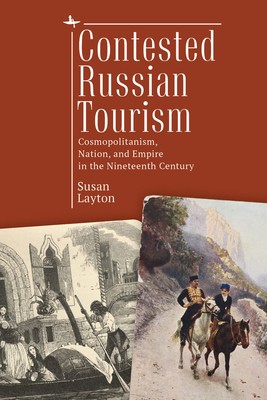
- We will send in 10–14 business days.
- Author: Susan Layton
- Publisher: Academic Studies Press
- ISBN-10: 1644694204
- ISBN-13: 9781644694206
- Format: 15.6 x 23.4 x 2.7 cm, hardcover
- Language: English
- SAVE -10% with code: EXTRA
Reviews
Description
This literary, cultural history examines imperial Russian tourism's entanglement in the vexed issue of cosmopolitanism understood as receptiveness to the foreign and pitted against provinciality and nationalist anxiety about the allure and the influence of Western Europe. The study maps the shift from Enlightenment cosmopolitanism to Byronic cosmopolitanism with special attention to the art pilgrimage abroad. For typically middle-class Russians daunted by the cultural riches of the West, vacationing in the North Caucasus, Georgia, and the Crimea afforded the compensatory opportunity to play colonizer kings and queens in "Asia." Drawing on Anna Karenina and other literary classics, travel writing, journalism, and guidebooks, the investigation engages with current debates in cosmopolitan studies, including the fuzzy paradigm of "colonial cosmopolitanism."
EXTRA 10 % discount with code: EXTRA
The promotion ends in 17d.19:42:21
The discount code is valid when purchasing from 10 €. Discounts do not stack.
- Author: Susan Layton
- Publisher: Academic Studies Press
- ISBN-10: 1644694204
- ISBN-13: 9781644694206
- Format: 15.6 x 23.4 x 2.7 cm, hardcover
- Language: English English
This literary, cultural history examines imperial Russian tourism's entanglement in the vexed issue of cosmopolitanism understood as receptiveness to the foreign and pitted against provinciality and nationalist anxiety about the allure and the influence of Western Europe. The study maps the shift from Enlightenment cosmopolitanism to Byronic cosmopolitanism with special attention to the art pilgrimage abroad. For typically middle-class Russians daunted by the cultural riches of the West, vacationing in the North Caucasus, Georgia, and the Crimea afforded the compensatory opportunity to play colonizer kings and queens in "Asia." Drawing on Anna Karenina and other literary classics, travel writing, journalism, and guidebooks, the investigation engages with current debates in cosmopolitan studies, including the fuzzy paradigm of "colonial cosmopolitanism."


Reviews